The Elliot Institute’s Track Record
Founded in July of 1988, the Elliot Institute has been a leader in the field of research, education, and advocacy for women, men, children and families at risk of or hurt by abortion.
The success of our research and education efforts has been proven in a recent national poll. It found that 85 percent of American adults believe negative emotional problems after an abortion are common to very common, and that post-abortion reactions are moderate to very severe. Even among respondents identifying themselves as “very pro-choice,” fully 60 percent shared this negative view of abortion’s impact on women. Only 15 percent of those polled believe abortion generally makes women’s lives better.
Following is an overview of our efforts:
ORIGINAL RESEARCH
We have authored or co-authored over 20 peer-reviewed papers that have appeared in major medical journals. These studies have irrefutably shown that abortion is associated with higher rates of suicide, substance abuse, psychiatric hospitalization, depression, anxiety, sleep disorders, parenting and relationship difficulties, and more. A sampling of these studies includes:
- Deaths associated with pregnancy outcome: a record linkage study of low income women. Southern Medical Journal
- Depression and unintended pregnancy in the National Longitudinal Survey of Youth: a cohort study. British Medical Journal
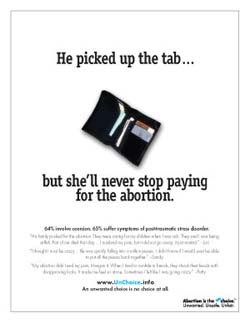
- Psychiatric admissions of low-income women following abortion and childbirth. Canadian Medical Association Journal
- Abortion and subsequent substance abuse. American Journal of Drug and Alcohol Abuse
- State-funded abortions vs. deliveries: A comparison of outpatient mental health claims over five years. American Journal of Orthopsychiatry
- Relative treatment rates for sleep disorders and sleep disturbances following abortion and childbirth: a prospective record based-study. Sleep
- Substance use among pregnant women in the context of previous reproductive loss and desire for current pregnancy. British Journal of Health Psychology
- The Psychology of Abortion: A Review and Suggestions for Future Research. Psychology and Health
- Generalized anxiety following unintended pregnancies resolved through childbirth and abortion: a cohort study of the 1995 National Survey of Family Growth. Journal of Anxiety Disorders
- Induced abortion and traumatic stress: A preliminary comparison of American and Russian women. Medical Science Monitor
- Substance use associated with unintended pregnancy outcomes in the National Longitudinal Survey of Youth. American Journal of Drug and Alcohol Abuse
- The duty to screen: clinical, legal and ethical implications of predictive risk factors of post-abortion maladjustment. Journal of Contemporary Health Law Policy
- The quality of caregiving environment and child development outcomes associated with maternal history of abortion using the NLSY data. Journal of Child Psychology and Psychiatry
Impact of Our Research
Our research has been ignored by the mainstream media for decades. But our findings are now frequently cited in malpractice cases, legislative hearings, and Supreme Court briefs. As a result, they are now being noticed (and derided) by the likes of The New York Times, Ms. Magazine, and Supreme Court Justice Ruth Bader Ginsburg.
Our research is also, slowly, impacting medical opinion. In 2008 the U.K.’s Royal College of Psychiatrists officially acknowledged that abortion may carry significant mental health risks. That advance, however, was offset in August of 2008 by a new position paper from the American Psychological Association (APA), which dismissed 49 recent studies showing abortion associated with post-abortion problems, saying they were all flawed.
After dismissing the bulk of recent research, the APA’s pro-abortion subcommittee concluded that, “there is no credible evidence that a single elective abortion of an unwanted pregnancy in and of itself causes mental health problems for adult women.”
Notably, this carefully worded conclusion (supported by just one foreign study) actually describes only the minority of abortion cases: those in which a single abortion is performed pm an adult woman with an unwanted pregnancy and who has freely chosen the abortion and has no contributing mental health problems.
Reading between the lines, the APA’s conclusion is actually an admission that there is credible evidence that negative mental health effects may impact women who (a) have multiple abortions, (b) abort as teens, (c) feel pressured or coerced to abort, (d) abort a wanted pregnancy, or (e) who have any prior mental health issues which abortion may contribute to or aggravate. Together, these groups represent the vast majority of women having abortions today.
PUBLISHING – Traditional and OnLine
We have written, edited, and/or published nine books, including:
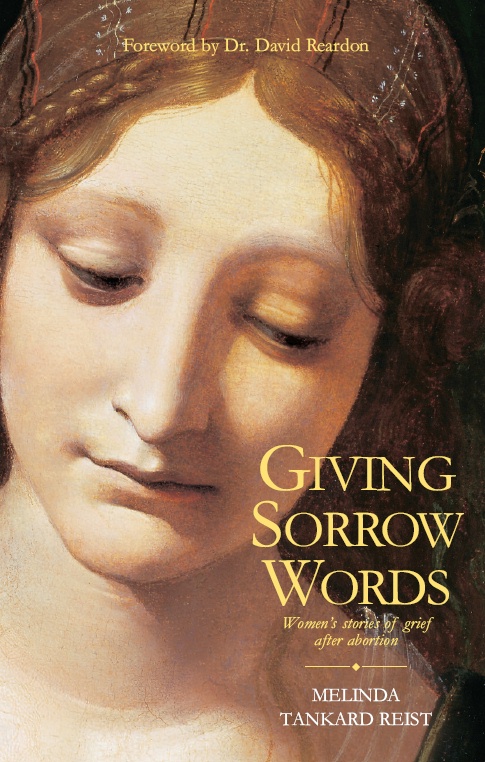
- Aborted Women, Silent No More
- Making Abortion Rare: A Healing Strategy for a Divided Nation
- The Jericho Plan: Breaking Down the Walls Which Prevent Post-Abortion Healing
- Victims and Victors: Speaking Out About Their Pregnancies, Abortions, and Children Resulting from Sexual Assault
- Detrimental Effects of Abortion: An Annotated Bibliography With Commentary
- Forbidden Grief: The Unspoken Pain of Abortion
- Giving Sorrow Words: Women’s Stories of Grief After Abortion
One of our books, Making Abortion Rare, became the basis of a six-part television series on EWTN (which is now available on DVD), and Forbidden Grief has been translated into Spanish, Russian, and Lithuanian.
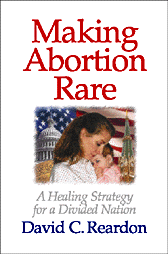
Each year, more than 3 million unique visitors visit one or more of our four websites: AfterAbortion.org, TheUnchoice.com, ElliotInstitute.org and our newest site, AbortionRisks.org. The latter, which was launched in 2008 and includes the Thomas W. Strahan Memorial Library, is a community-based website that allows users to contribute content regarding post-abortion issues.
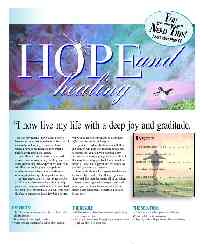
In addition, we have written, published, and distributed nearly 2 million copies of our newspaper insert. Hope & Healing. This
publication provides clear and compelling information on the risks of abortion and lets those who have had an abortion know they are not alone and that healing is possible.
As one reader told us, “If this paper had been available to me in college I would never have had an abortion.” We have also created and distributed countless articles, brochures, and fact sheets that have been reproduced and distributed by countless groups and individuals around the world. And we have published over 60 editions of our quarterly publication, The Post-Abortion Review.
THE UNCHOICE AD, EDUCATION AND OUTREACH CAMPAIGN
In response to strong new evidence about widespread pressure, coercion, disinformation, professional negligence and even violence being used against women undergoing abortions, we updated existing educational materials and developed The UnChoice ad, education and outreach campaign. Our ads and other materials direct people to The UnChoice web site at www.TheUnChoice.com, where they will find helpful information and free and low-cost resources that they can download and share with others.
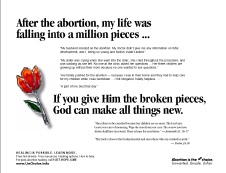 This comprehensive multi-media campaign incorporates the latest evidence of widespread unwanted., coerced and even forced abortion, as well as the expertise and insights of the Elliot Institute and other leaders who specialize in complex and highly sensitive pregnancy- and abortion-related issues. It is designed to appeal to general-interest audiences who may be new to these issues and is written in a manner that is respectful of the complex and deeply personal issues surrounding abortion and the pain of those who lost a loved one to abortion or its aftermath.
This comprehensive multi-media campaign incorporates the latest evidence of widespread unwanted., coerced and even forced abortion, as well as the expertise and insights of the Elliot Institute and other leaders who specialize in complex and highly sensitive pregnancy- and abortion-related issues. It is designed to appeal to general-interest audiences who may be new to these issues and is written in a manner that is respectful of the complex and deeply personal issues surrounding abortion and the pain of those who lost a loved one to abortion or its aftermath.
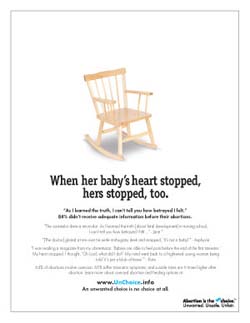 The UnChoice campaign provides post-abortion ministries, pregnancy centers, and pro-life groups with professionally-prepared print ads, radio ads, television ads, billboards, reports, articles, fact sheets, postcards, small space ads and other resources for free or little cost. We have also developed sample letters to the editor, news releases, pr kits, “how to” guidelines and other tools to help pro-life groups communicate this message effectively at little cost.
The UnChoice campaign provides post-abortion ministries, pregnancy centers, and pro-life groups with professionally-prepared print ads, radio ads, television ads, billboards, reports, articles, fact sheets, postcards, small space ads and other resources for free or little cost. We have also developed sample letters to the editor, news releases, pr kits, “how to” guidelines and other tools to help pro-life groups communicate this message effectively at little cost.
The UnChoice ads and educational materials are being used in a number of states including (to name just a few) Colorado, Michigan, New Jersey, Indiana, Texas, California, Kentucky, Louisiana, New York, Tennessee, South Carolina, Alabama, Hawaii and more. Learn more and view, download and share these resources at www.TheUnChoice.com.
THE CHURCH AWARENESS PROJECT

In 2010 we launched the Church Awareness Project, a new effort to help mobilize and transform churches to recognize and speak out about the harm caused by abortion, raise
awareness of coerced and unwanted abortions, and to become places of support for women, men and families who may be at risk of exploitation because of a difficult or crisis pregnancy, or those who have already been hurt by abortion.
We have sent free resources to nearly 400 individuals and church leaders, including a copy of The Jericho Plan, which will help teach pastors how to preach on abortion in a way that is truthful yet compassionate, and unites rather than divides our family. Churches will be participating in a special event in April to help raise awareness of these issues.
IMPACT ON LEGISLATION AND JURISPRUDENCE
Pro-life legal firms consistently rely on our research in arguments and court briefs. One such public policy law firm, Americans United for Life, stated in their 2009 strategy guide that the pro-life movement:
“will not make significant progress until women and the public know, understand, and believe the medical risks of abortion.” They call for efforts to “[e]nhance research and data on the medical risks to women from abortion and to raise public awareness of the medical risks. Doing so will put us on a path to reversing Roe and protecting women and unborn [children] from abortion.” — (Americans United for Life, Defending Life, 2009: Proven Strategies for a Pro-Life America, “The Road Map to Reversing Roe v. Wade.”)
Because our peer reviewed medical studies have demonstrated that the physical and mental health risks of abortion exceed the risks of pregnancy and childbirth, even in the first trimester, these findings are providing a new basis for regulating abortion. Indeed, in a majority opinion written by Supreme Court Anthony Kennedy, who is the key swing vote on the Court, Justice Kennedy supported expanded rights of the state to regulate abortion because “[s]evere depression and loss of esteem can follow” an abortion.
Our model legislation, the Prevention of Coerced and Unsafe Abortions Act, fits within the framework of laws that Kennedy has indicated he would support. One form of our bill passed in Nebraska in 2010, and another form has passed both houses in South Dakota and is awaiting the governor’s signature. To learn more, visit www.StopForcedAbortions.org. These new laws, for the first time ever, are exposing abortion providers to proper liability for the psychological injuries caused by abortion, especially if they fail to screen for known risk factors.

In it’s battle to prevent these statutes from taking effect, Planned Parenthood has declared that they would not be able to provide abortions if they were required to do comprehensive screening of if women who “regretted” were allowed to sue them.
In other words, Planned Parenthood is admitting they can only afford to do abortions if (1) they are not held liable to screen for risk factors or to fully inform women of their unique risks, and (3) they are protected liability for psychological injuries.
We are highly confident that the constitutionality of these laws will ultimately be upheld. Even a very pro-abortion biased report by the American Psychological Association has acknowledged that there are over a dozen risk factors identifying the women most likely to have psychological problems after an abortion.
Once these issues are adjudicated, even liberal judges will be unable to discover a constitutional right for abortion providers to ignore proven risk factors. Doing so would undermine the obligation of all physicians to safeguard their patients’ health, not just abortionists. All the principles of evidence-based medicine are on our side. Their objections to our pre-abortion screening requirements will inevitably fail.
OUR PRESENT
We have completed the initial data preparation of a database encompassing more than 500,000 women who were tracked over a 30-year period. This study is on hold, however, due to lack of funding for an epidemiologist.
We are continuing to work with advocacy groups and legislators interested in our model legislation, which would hold abortionists fully liable for their negligent abortion counseling and screening practices. These harmful practices have exposed countless women to unwanted, unsafe, and unnecessary abortions.
We are also continuing to engage in numerous other educational and public awareness efforts through print publications, web sites, media interviews, newsletters, email and other venues, and by serving as the leading resource for information on unwanted and coerced abortions and post-abortion trauma for pro-life advocates and concerned citizens throughout the world.
OUR UNCERTAIN FUTURE
All of our accomplishments over the last 20 years have been completed with an average annual budget of less than $130,000 per year, no more than three employees on staff, and fewer than 400 donors per year.
For the first nine months of our current fiscal year (July 1, 2010 thru March 15, 2011), our donations are down $39,062 compared to a year ago.
Please prayerfully consider supporting our work with a gift for general support and/or a gift earmarked for one of our major project areas.
Thank you.
Please make a tax deductible contribution
to support the Elliot Institute’s work.
1. Donate by Check or Money OrderMail us a check or money order. Maximizes your contribution because there are no fees. But it does take a bit longer and you pay the postage.

Mail To: Elliot Institute
PO Box 7348
Springfield, IL 62791-7348
2. Online Credit Card Donation. PayPal will process your credit card on line.* Fees will reduce your donation by 2.9% plus $0.30 per transaction.
Make An Online Donation
3. Call 1-888-412-2676 during office hours to make a donation by phone.Our office hours are 9am-5pm (CST) Monday – Friday.
4. Become A Sustaining Partner. Our Sustaining Partners are the “backbone” of our ministry and support our work through donations made on a regular basis. Sustaining Partners pledge to make regular gifts for a year but choose the amount and how often they want to give.
You can become a Sustaining Partner by downloading a pledge form and mailing it to us, or contact us 1-888-412-2676.
Learn more about the Elliot Institute’s work here.
Question or difficulty??
Elliot Institute PO Box 7348 Springfield, IL 62791-7348
+1 217 525 8202

